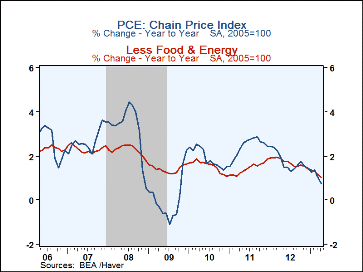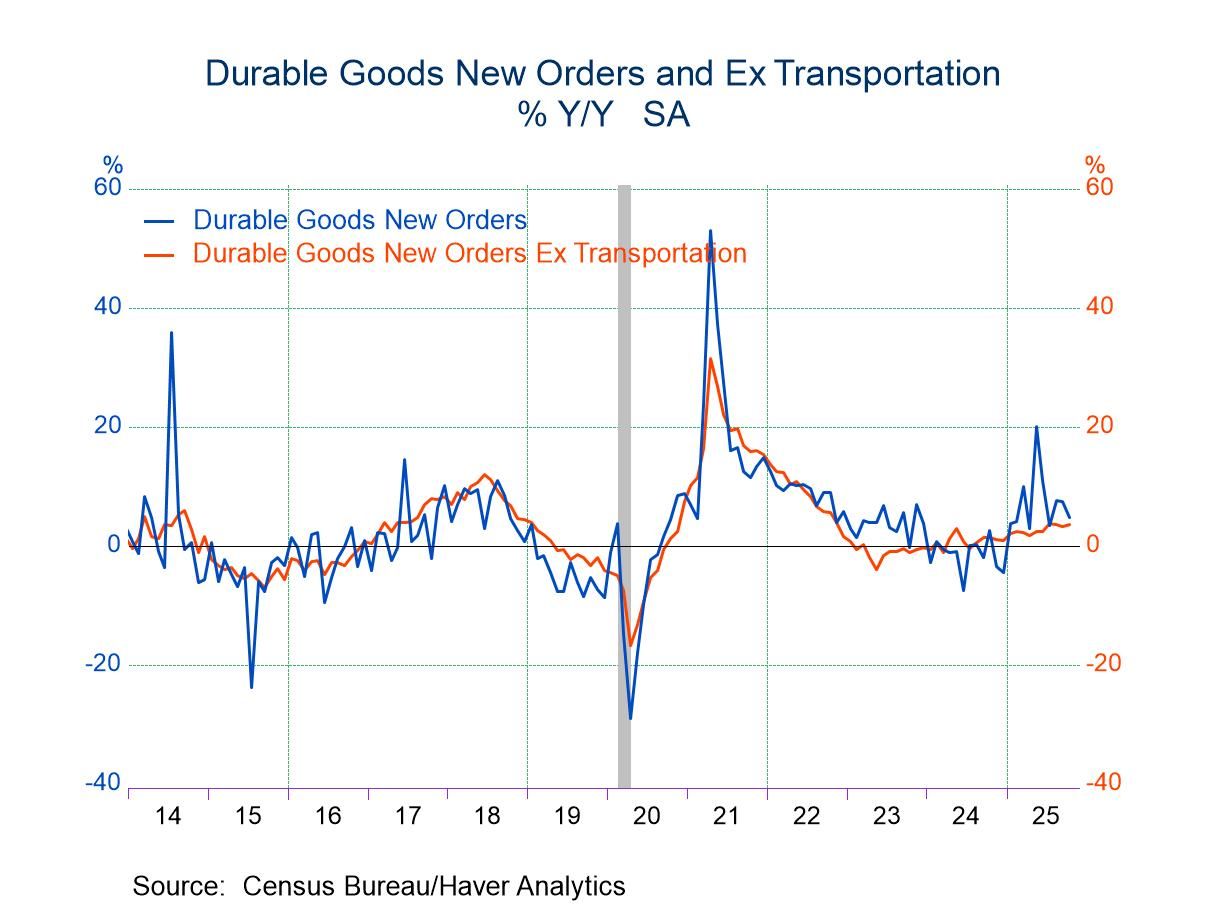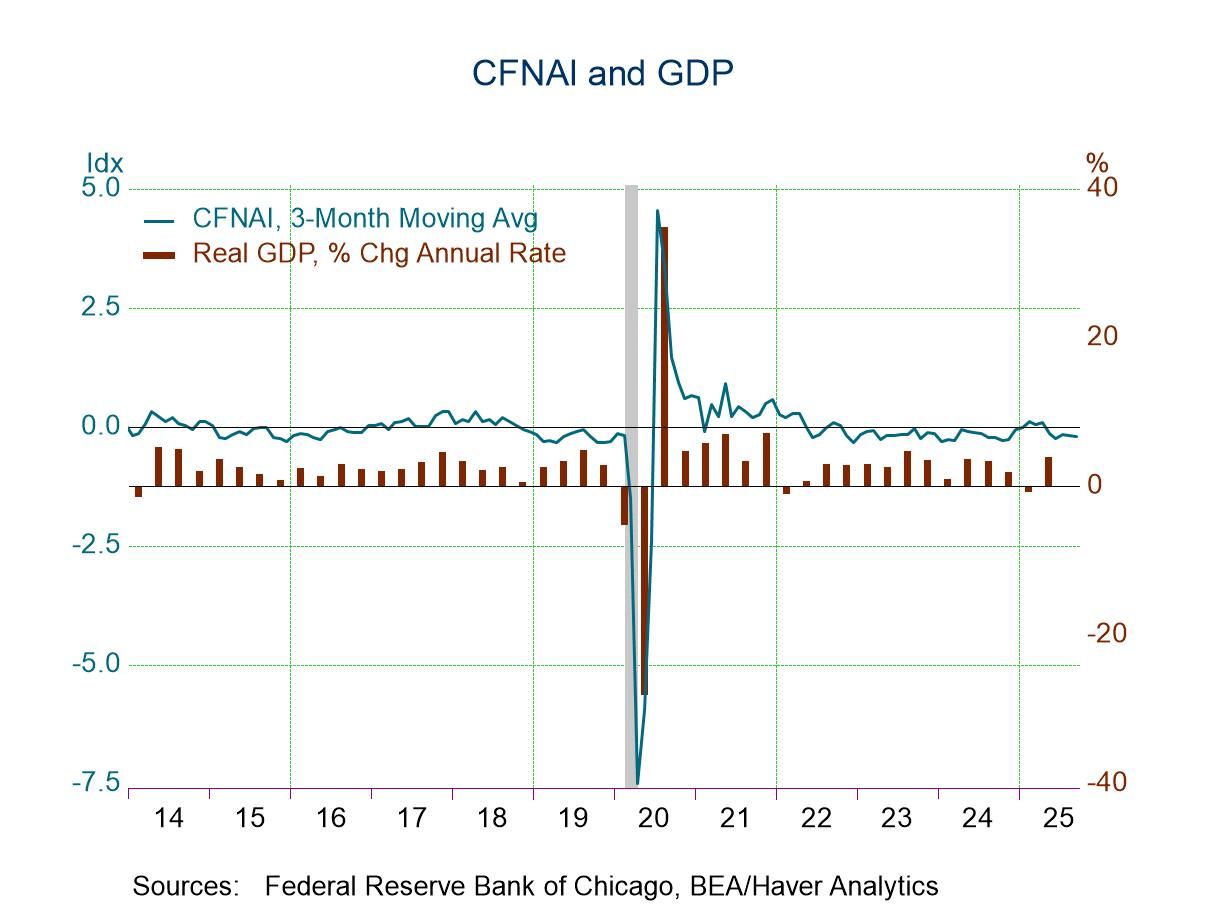 Global| May 31 2013
Global| May 31 2013U.S. Personal Income, Spending and Prices Fall; Savings Remain Lean
by:Tom Moeller
|in:Economy in Brief
Summary
Personal income moved marginally lower during April (2.8% y/y) following a 0.3% March advance, initially reported as 0.2%. The income figure fell short of consensus expectations for a 0.2% increase. No change in wages and salaries [...]
 Personal income moved marginally lower during April (2.8% y/y) following
a 0.3% March advance, initially reported as 0.2%. The income figure fell
short of consensus expectations for a 0.2% increase. No change in wages
and salaries (3.2% y/y) followed a 0.2% increase. Rental income ticked up
0.1% (14.7% y/y) but proprietors income reversed earlier strength and fell
0.7% (+6.2% y/y). Dividend income remained firm with a 1.0% rise (8.4%
y/y). A 0.5% advance (-0.5% y/y) in interest income followed three
consecutive months of 0.9% decline. Transfer receipts were off 0.6% (+2.7%
y/y). Notable was the 3.0% drop (-30.8% y/y) in jobless insurance benefits.
Personal income moved marginally lower during April (2.8% y/y) following
a 0.3% March advance, initially reported as 0.2%. The income figure fell
short of consensus expectations for a 0.2% increase. No change in wages
and salaries (3.2% y/y) followed a 0.2% increase. Rental income ticked up
0.1% (14.7% y/y) but proprietors income reversed earlier strength and fell
0.7% (+6.2% y/y). Dividend income remained firm with a 1.0% rise (8.4%
y/y). A 0.5% advance (-0.5% y/y) in interest income followed three
consecutive months of 0.9% decline. Transfer receipts were off 0.6% (+2.7%
y/y). Notable was the 3.0% drop (-30.8% y/y) in jobless insurance benefits.
A 0.2% decline (+2.8% y/y) in personal consumption expenditures followed March's 0.1% uptick. No change in spending was expected. Lower prices prompted an 8.4% decline (-10.6% y/y) in spending on gasoline. Consumers took the money and spent it on clothing, up 1.0% (4.0% y/y), and furniture & appliances, up 0.7% (4.6% y/y). Motor vehicle expenditures slipped marginally (+8.5% y/y), off for the third consecutive month. Services spending ticked up 0.1% (3.2% y/y), bolstered by a 0.9% jump (5.5% y/y) in outlays at restaurants & hotels.
The personal savings rate held stable at a low 2.5%. The level remained well below the 3.5% rate 12 months ago and the 4.0%-to-5.5% averages of the prior four years.
The PCE chain price index declined 0.3% (+0.7% y/y) pulled lower by a 7.7% drop (-8.0% y/y) in gasoline & energy prices. Elsewhere, durable goods prices fell 0.3% (-1.8% y/y) while apparel prices were off the same 0.3% (+0.3% y/y). Food prices ticked up another 0.1% (1.1% y/y) while services prices also inched up 0.1% (1.7% y/y). The price index excluding food & energy was unchanged (1.1% y/y).
Adjusted for price changes, disposable income during April ticked up 0.1% (1.0% y/y) while real spending also inched up 0.1% (2.1% y/y).
The personal income & consumption figures are available in Haver's USECON and USNA databases. The consensus expectation figure is in the AS1REPNA database.
Estimating the Trend Rate of Economic Growth Using the CFNAI from the Federal Reserve Bank of Chicago can be found here.
| Personal Income & Outlays (%) | Apr | Mar | Feb | Y/Y | 2012 | 2011 | 2010 |
|---|---|---|---|---|---|---|---|
| Personal Income | -0.0 | 0.3 | 1.2 | 2.8 | 3.5 | 5.1 | 3.8 |
| Wages & Salaries | 0.0 | 0.2 | 0.7 | 3.2 | 3.3 | 4.0 | 2.1 |
| Disposable Personal Income | -0.1 | 0.2 | 1.2 | 1.7 | 3.3 | 3.8 | 3.8 |
| Personal Consumption Expenditures | -0.2 | 0.1 | 0.8 | 2.8 | 3.7 | 5.0 | 3.8 |
| Personal Saving Rate | 2.5 | 2.5 | 2.4 | 3.5 (Apr'12) |
3.9 | 14.2 | 5.1 |
| PCE Chain Price Index | -0.3 | -0.1 | 0.4 | 0.7 | 1.7 | 2.4 | 1.9 |
| Less Food & Energy | 0.0 | 0.1 | 0.1 | 1.1 | 1.7 | 1.4 | 1.5 |
| Real Disposable Income | 0.1 | 0.3 | 0.8 | 1.0 | 1.5 | 1.3 | 1.8 |
| Real Personal Consumption Expenditures | 0.1 | 0.2 | 0.4 | 2.1 | 1.9 | 2.5 | 1.8 |
Tom Moeller
AuthorMore in Author Profile »Prior to joining Haver Analytics in 2000, Mr. Moeller worked as the Economist at Chancellor Capital Management from 1985 to 1999. There, he developed comprehensive economic forecasts and interpreted economic data for equity and fixed income portfolio managers. Also at Chancellor, Mr. Moeller worked as an equity analyst and was responsible for researching and rating companies in the economically sensitive automobile and housing industries for investment in Chancellor’s equity portfolio. Prior to joining Chancellor, Mr. Moeller was an Economist at Citibank from 1979 to 1984. He also analyzed pricing behavior in the metals industry for the Council on Wage and Price Stability in Washington, D.C. In 1999, Mr. Moeller received the award for most accurate forecast from the Forecasters' Club of New York. From 1990 to 1992 he was President of the New York Association for Business Economists. Mr. Moeller earned an M.B.A. in Finance from Fordham University, where he graduated in 1987. He holds a Bachelor of Arts in Economics from George Washington University.








